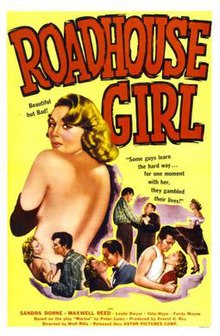Marilyn (1953 film)
| Marilyn | |
|---|---|
 Theatrical release poster | |
| Directed by | Wolf Rilla |
| Written by | Wolf Rilla |
| Story by | Peter Jones (play Marion) |
| Produced by | Ernest G. Roy |
| Starring | Sandra Dorne Maxwell Reed |
| Cinematography | Geoffrey Faithfull |
| Edited by | Peter Seabourne |
| Music by | Wilfred Burns |
Production company | |
| Distributed by | Butcher's Film Service (UK) Astor Pictures (US) |
Release date | 1953 (UK) August 1955 (US) |
Running time | 70 minutes |
| Country | United Kingdom |
| Language | English |
Marilyn, released in the United States as Roadhouse Girl, is a 1953 British film noir directed by Wolf Rilla starring Sandra Dorne and Maxwell Reed.[1]
Plot[]
Drifter mechanic Tom Price (Reed) lusts after seductive Marilyn (Dorne), the young wife of ill-tempered garage owner George Saunders (Dwyer). Assuming (correctly) that Marilyn is fooling around with his employee, Saunders angrily confronts him. Defending himself, Tom accidentally kills his boss. Marilyn helps him to cover up the crime - the inquest verdict is "accidental death" - and they begin a new life together.
Several months later the couple are running a just-getting-by "American bar". Wealthy businessman Nicky Everton (Mayne) agrees to lend the couple some money, believing that Marilyn will offer her affections as repayment. Everton later changes his mind as he feels they won't be happy in the longer term; and Price also walks out, frustrated by her erratic behaviour and in particular her lack of lasting commitment to him. Throughout all this, Rosie, Marilyn's maid, has kept the dark secret of Saunders' death to herself, until she is taken for granted once too often by her self-centred boss. Marilyn is left alone with her hopes and fears.
Cast[]
- Sandra Dorne as Marilyn Saunders
- Maxwell Reed as Tom Price
- Leslie Dwyer as George Saunders
- Vida Hope as Rosie
- Ferdy Mayne as Nicky Everton
- Hugh Pryse as Coroner
- Kenneth Connor as Customer in Roadhouse
- Ben Williams as Jury Foreman
Critical reception[]
Marilyn was selected by film historians Steve Chibnall and Brian McFarlane as one of the 15 most meritorious British B films made between World War II and 1970. The authors note that it is "symptomatic of a transatlantic turn in the British 'B'" and praise its depiction of a "pervasive sense of dissatisfaction with things as they are".[2]
References[]
- ^ Roadhouse Girl at the BFI Database
- ^ Steve Chibnall & Brian McFarlane, The British 'B' Film, Palgrave Macmillan, London, 2009, pp. 268–70.
External links[]
- English-language films
- 1953 films
- British films
- British crime drama films
- 1953 crime drama films
- Films directed by Wolf Rilla
- Film noir
- Films produced by Ernest G. Roy
- British black-and-white films
- Crime drama film stubs
- 1950s British film stubs